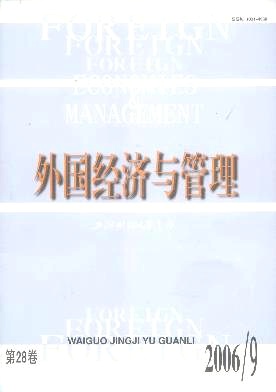城市固体废弃物规制政策研究综述——推进循环经济的前沿领域
外国经济与管理 2006 年 第 28 卷第 09 期, 页码:59 - 65
摘要
参考文献
摘要
从20世纪80年代后期开始,研究城市固体废弃物规制政策的文献开始大量涌现。固体废弃物规制的目标是使垃圾生产的社会边际成本等于私人边际成本(即垃圾外部性内部化),从而减少市场失灵,最终实现固体废弃物减量化、再利用和再循环。本文主要介绍三类固体废弃物规制政策(垃圾收费政策、原生材料征税与再生材料补贴、预收处理费用和押金返还制度),并进行简要评价,以期为我国城市固体废弃物规制政策的选择和制定提供借鉴。
[1]D inan,TerryM.Econom ic efficiency aspects of alternative policies for reducing waste d isposal[J].Journal of Environm ental E-conom ics and Managem ent,1993,25:242-256.
[2]W ertz,L Kenneth.Econom ic factors influencing household’s production of refuse[J].Journal of Environm ental Econom ics andManagem ent,1976,2:263-272.
[3]Jenk ins,Rob in R.The econom ics of solid waste reduction:the impact of user fees[M].Cheltenham,UK:Edward Engar,1993.
[4]Fu llerton,Don,and K innaman,Tom.Household response to pricing garbage by the bag[J].Am erican Econom ic Review,1996,86(4):971-984.
[5]K innaman,Thomas C,and Fu llerton,Don.The econom ics of residential solid waste managem ent[EB/OL].National Bureau ofEconom ic Research,W ork ing Paper 7326,http://www.nber.org/w7326,1999.
[6]Chakrabarti,S,and Sarkhel,P.Econom ics of solid waste managem ent:a survey of existing literature[EB/OL].Kolkata:Eco-nom ic Research Un it,Ind ian Statistical Institute,www.isical.ac.in/~eru,2003.
[7]Turner,Pearce.Environm ental econom ics:an elem entary introduction[M].New York:HarvesterW heatsheaf,1994.
[8]M ied ima,A llen K.Fundam ental econom ic comparisons of solid waste policy options[J].Resources and Energy,1983,5:21-43.
[9]Ackerman,Frank.W hy do we recycle?[M].W ash ington D.C.:Island Press,1997.
[10]Palm er,Karen,and W alls,Margaret.Material use and solid waste:an evaluation of policies[R].Resources of the Future D is-cussion Paper No.95-05,October,1994.
[11]Fu llerton,Don,and K innaman,Tom.Garbage,recycling,and illegal burn ing or dump ing[J].Journal of Environm ental Eco-nom ics and Managem ent,1995,29:78-91.
[12]Palm er,Karen,and W alls,Margaret.Optimal policies for solid waste d isposal and recycling:taxes,subsid ies,and standards[J].Journal of Pub lic Econom ics,1997,65(2):193-205.
[13]S igman,H ilary A.A comparison of pub lic policies for lead recycling[J].RAND Journal of Econom ics,1995,26(3):452-478.
[14]Anderson,RobertC,and Sp iegelman,R ichard D.Tax policy and secondary material use[J].Journal ofEnvironm ental Econom-ics and Managem ent,1997,4:68-82.
[15]Palm er,Karen,S igman,H ilary,andW alls,Margaret.The cost of reducingmun icipal solid waste[J].Journal ofEnvironm entalEconom ics and Managem ent,1997,33(2):128-150.
[16]Dobbs,Ian M.L itter and waste managem ent:d isposal taxes versus user charges[J].Canad ian Journal of Econom ics,1991,24(1):221-227.
[17]Zoboli,R.The integrated use of econom ic instrum ents in the policy ofmun icipal solid waste[A].The managem ent ofmun icipalsolid waste in Europe:econom ics,technological and environm ental respective[C].D evelopm ents in Environm ental Econom ics-5 M ilan,1993.
[18]Calcott,Pau l,andW alls,Margaret.Can downstream waste d isposal policies encourage upstream“design for environm ent?”[J].Am erican Econom ic Review:Papers and Proceed ings,2000,90:233-237.
[19][美]保罗.R.伯特尼,罗伯特.N.史蒂文斯编;穆贤清,方志伟译.环境保护公共政策[M].上海:上海三联书店,上海人民出版社,2004.
[20]苗建青.论循环经济的效率问题———日本废弃物回收政策研究[J].外国经济与管理,2005,27(12):51-63.
[2]W ertz,L Kenneth.Econom ic factors influencing household’s production of refuse[J].Journal of Environm ental Econom ics andManagem ent,1976,2:263-272.
[3]Jenk ins,Rob in R.The econom ics of solid waste reduction:the impact of user fees[M].Cheltenham,UK:Edward Engar,1993.
[4]Fu llerton,Don,and K innaman,Tom.Household response to pricing garbage by the bag[J].Am erican Econom ic Review,1996,86(4):971-984.
[5]K innaman,Thomas C,and Fu llerton,Don.The econom ics of residential solid waste managem ent[EB/OL].National Bureau ofEconom ic Research,W ork ing Paper 7326,http://www.nber.org/w7326,1999.
[6]Chakrabarti,S,and Sarkhel,P.Econom ics of solid waste managem ent:a survey of existing literature[EB/OL].Kolkata:Eco-nom ic Research Un it,Ind ian Statistical Institute,www.isical.ac.in/~eru,2003.
[7]Turner,Pearce.Environm ental econom ics:an elem entary introduction[M].New York:HarvesterW heatsheaf,1994.
[8]M ied ima,A llen K.Fundam ental econom ic comparisons of solid waste policy options[J].Resources and Energy,1983,5:21-43.
[9]Ackerman,Frank.W hy do we recycle?[M].W ash ington D.C.:Island Press,1997.
[10]Palm er,Karen,and W alls,Margaret.Material use and solid waste:an evaluation of policies[R].Resources of the Future D is-cussion Paper No.95-05,October,1994.
[11]Fu llerton,Don,and K innaman,Tom.Garbage,recycling,and illegal burn ing or dump ing[J].Journal of Environm ental Eco-nom ics and Managem ent,1995,29:78-91.
[12]Palm er,Karen,and W alls,Margaret.Optimal policies for solid waste d isposal and recycling:taxes,subsid ies,and standards[J].Journal of Pub lic Econom ics,1997,65(2):193-205.
[13]S igman,H ilary A.A comparison of pub lic policies for lead recycling[J].RAND Journal of Econom ics,1995,26(3):452-478.
[14]Anderson,RobertC,and Sp iegelman,R ichard D.Tax policy and secondary material use[J].Journal ofEnvironm ental Econom-ics and Managem ent,1997,4:68-82.
[15]Palm er,Karen,S igman,H ilary,andW alls,Margaret.The cost of reducingmun icipal solid waste[J].Journal ofEnvironm entalEconom ics and Managem ent,1997,33(2):128-150.
[16]Dobbs,Ian M.L itter and waste managem ent:d isposal taxes versus user charges[J].Canad ian Journal of Econom ics,1991,24(1):221-227.
[17]Zoboli,R.The integrated use of econom ic instrum ents in the policy ofmun icipal solid waste[A].The managem ent ofmun icipalsolid waste in Europe:econom ics,technological and environm ental respective[C].D evelopm ents in Environm ental Econom ics-5 M ilan,1993.
[18]Calcott,Pau l,andW alls,Margaret.Can downstream waste d isposal policies encourage upstream“design for environm ent?”[J].Am erican Econom ic Review:Papers and Proceed ings,2000,90:233-237.
[19][美]保罗.R.伯特尼,罗伯特.N.史蒂文斯编;穆贤清,方志伟译.环境保护公共政策[M].上海:上海三联书店,上海人民出版社,2004.
[20]苗建青.论循环经济的效率问题———日本废弃物回收政策研究[J].外国经济与管理,2005,27(12):51-63.
引用本文
王建明, 彭星闾. 城市固体废弃物规制政策研究综述——推进循环经济的前沿领域[J]. 外国经济与管理, 2006, 28(9): 59–65.
导出参考文献,格式为:
上一篇:家族企业代际传承影响因素研究述评





 7782
7782  0
0

